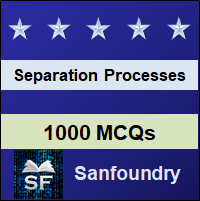
Separation Processes Multiple Choice Questions Highlights
- 1000+ Multiple Choice Questions & Answers (MCQs) in Separation Processes with a detailed explanation of every question.- These MCQs cover theoretical concepts, true-false(T/F) statements, fill-in-the-blanks and match the following style statements.
- These MCQs also cover numericals as well as diagram oriented MCQs.
- These MCQs are organized chapterwise and each Chapter is futher organized topicwise.
- Every MCQ set focuses on a specific topic of a given Chapter in Separation Processes Subject.
Who should Practice Separation Processes MCQs?
– Students who are preparing for college tests and exams such as mid-term tests and semester tests on Separation Processes.- Students who are preparing for Online/Offline Tests/Contests in Separation Processes.
– Students who wish to sharpen their knowledge of Separation Processes Subject.
- Anyone preparing for Aptitude test in Separation Processes.
- Anyone preparing for interviews (campus/off-campus interviews, walk-in interview and company interviews).
- Anyone preparing for entrance examinations and other competitive examinations.
- All - Experienced, Freshers and College / School Students.
Separation Processes Chapters
Here's the list of chapters on the "Separation Processes" subject covering 100+ topics. You can practice the MCQs chapter by chapter starting from the 1st chapter or you can jump to any chapter of your choice.- Separation Processes
- Thermodynamics of Separation Operations
- Mass Transfer and Diffusion
- Single Equilibrium Stages and Flash Calculations
- Cascades and Hybrid Systems
- Absorption and Stripping of Dilute Mixtures
- Distillation of Binary Mixtures
- Liquid-Liquid Extraction with Ternary Systems
- Approximate Methods for Multicomponent Multistage Separations
- Enhanced and Batch Distillation
- Membrane Separations
- Adsorption, Ion Exchange, Chromatography and Electrophoresis, Leaching and Washing
- Crystallization, Desublimation and Evaporation
- Drying of Solids
- Mechanical separation of Phases
1. Separation Processes
The section contains multiple choice questions and answers on industrial chemical processes, basic separation techniques, phase additions or creations, solid agents and barriers, external fields or gradient, bio and feasible solutions.
2. Thermodynamics of Separation Operations
The section contains questions and answers on energy, entropy, phase equilibria, ideal gas and ideal liquid solutions, graphical corelations, nonideal thermodynamic models, difficult mixtures and liquid activity coefficient models.
3. Mass Transfer and Diffusion
The section contains MCQs on steady and unsteady state mass transfer, mass transfer in laminar flow and turbulent flow, two film theory and mass transfer coefficients.
4. Single Equilibrium Stages and Flash Calculations
The section contains multiple choice questions and answers on binary vapour liquid system, solid and gas liquid systems, multicomponent flash and multiphase systems.
|
|
|
5. Cascades and Hybrid Systems
The section contains questions and answers on solid liquid cascades and cascade configurations.
|
|
|
6. Absorption and Stripping of Dilute Mixtures
The section contains MCQs on algebraic methods, rate base methods and stage efficiency.
|
|
|
7. Distillation of Binary Mixtures
The section contains multiple choice questions and answers on mccabe thiele graphical method and rate base method for packed distillation columns.
|
|
|
8. Liquid-Liquid Extraction with Ternary Systems
The section contains questions and answers on solvent equipment extractions, hunter nash and maloney schubart graphical equilibrium, bioproducts extraction.
|
|
|
9. Approximate Methods for Multicomponent Multistage Separations
The section contains MCQs on fug method, kremser group and newton raphson methods.
|
|
|
10. Enhanced and Batch Distillation
The section contains multiple choice questions and answers on extractive and salt distillation, pressure swing distillation, homogeneous and heterogeneous azeotropic distillation, reactive and differential distillation.
11. Membrane Separations
The section contains questions and answers on membrane materials, separation membranes, dialysis, electrodialysis, reverse osmosis, pervaporation, membrane modules and binary azeotropic mixtures.
|
|
|
12. Adsorption, Ion Exchange, Chromatography and Electrophoresis, Leaching and Washing
The section contains MCQs on slurry and fixed bed adsorption, ion exchange cycle, electrophoresis, rate base models for leaching.
|
|
|
13. Crystallization, Desublimation and Evaporation
The section contains multiple choice questions and answers on msmpr crystallization, precipitation, zone melting, desublimation, evaporation, bioproduct and melt crystallization, batch crystallization and equipment, drying equipment.
14. Drying of Solids
The section contains questions and answers on psychrometry, dryer models, byproducts, heat batch and continous system, air suspended drying systems and equilibrium moisture content.
15. Mechanical separation of Phases
The section contains MCQs on solid liquid cake filtration devices, biotechnology mechanical seperations, commercial adsorbents and its applications.
Wish you the best in your endeavor to learn and master Separation Processes!
